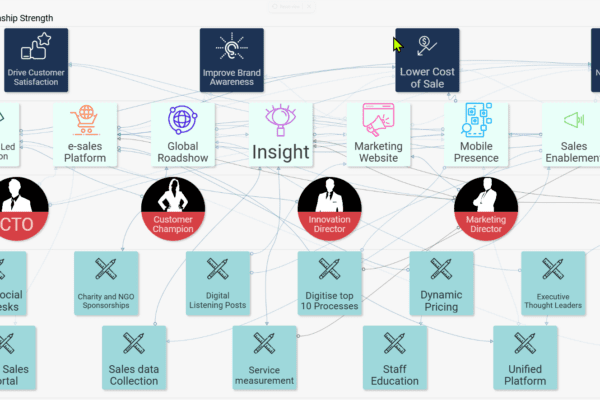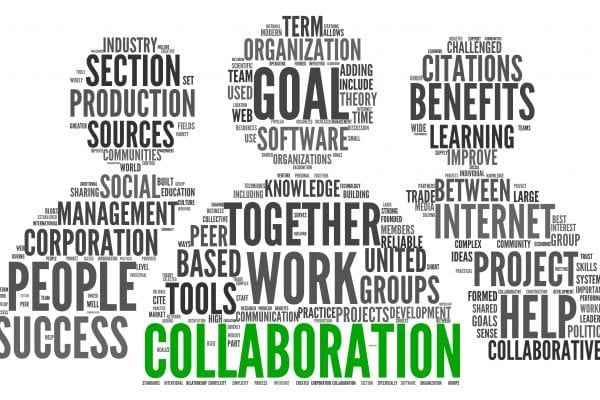Visual collaboration can be used by SME organisations to gain competitive advantage.
If you have to work with people who are separated by distance and time you can use visual collaboration to work more productively.
A key benefit is gaining competitive advantage by being more productive and creating dynamic relationships with your customers, clients and partners.
Enterprise Collaboration
No matter what size of company or organisation you are, being able to see and speak to other people and customer’s in different locations and time zones can help you develop a trusting relationship, which over time will become mutually beneficial to both you and the person you are working with.
Incorporating visual collaboration into your overall business collaboration approach is now an imperative for you. This includes:
- Physical Collaboration – people working collaboratively
- Data Collaboration – connecting and sharing data between systems and tools
- Digital Collaboration – video conferencing, chat and instant messaging
Due to the continuing globalisation of businesses, the ongoing recession, the reduction of resources and increased work load means you have to do more with less.
This includes establishing, developing and maintaining a working collaborative business relationship with people you may never actually physically meet.
Connecting with people collaboratively
If you are a small to medium size enterprise (SME), implementing videoconferencing and telepresence is now a reality using internet based solutions. By talking and seeing people online means you do not have to travel, which is one of the ways to improve your productivity by saving time and money on various activities such as travelling.
But as a SME, typically you don’t have the IT and communication departments to help you, unlike the large corporations. This can be overcome and achieved by using the services of a videoconferencing managed service provider (MSP).
As an SME you are faced with the challenge of trying to select which solution is best for you, while the technology continues to innovate and change on a daily basis. So endeavouring to select the most appropriate technology, pay for the upfront capital investment and the ongoing operational costs is certainly a barrier to entry for you as a SME.
Utilising a video conferencing MSP helps to remove these barriers for you.
Visual Collaboration Technology
Since video conferencing first began, the delay in meetings not starting on time due to inter-operability issues, other peoples end points not working between different video conferencing systems or even trying to work out how to switch on the video conference unit and connect successfully has been a constant issue for users and “non- technical support” people alike. The whole experience leading up to the meeting and during the meeting becomes very stressful and unpleasant. It certainly does not help to deliver a productive meeting if you are constantly worrying about whether the system is going to work or not.
Using a MSP removes all of these issues with 24 x 7 support, technology that is being monitored and maintained real time, a video conference host who will connect everyone together and is on hand at any time to help reduces the stress levels and allows you to get on and visually collaborate with confidence.
But what about the issue when your business grows and you have more people to collaborate with?
You are not limited when using an MSP. You will be able to easily expand the use of visual collaboration across your business in a cost effective way and increase your productivity with more users working virtually, helping to improve your Return On Investment (ROI) and supports you in becoming more competitive.
What makes visual collaboration different to just video conferencing?
Being able to see and talk to other people is just one part of visual collaboration and is quite the norm for many people and businesses today that use video conferencing. Visual collaboration is about seeing, talking as well as sharing and storing data and information real-time so people can actually do work when they meet, instead of just talking and taking notes.
When using the word “collaboration” you need to be clear what this means. It is not another word for communication – communication is one part of collaboration. Generally, collaboration in this sense means people working together to deliver an agreed outcome successfully. For that to happen there has to be:
- Communication and discussion
- Contract in the form of a plan or agreement
- Achievement so that action is taken and work is completed
- Results that are agreed outcomes and create added value
Visual Collaboration Benefits
The fact that we complete this “collaboration” process “visually” from two (or more) different locations at the same time, share stored data and create information real-time are the key differences.
Thinking about the type of meetings you have now and moving to a visual collaborative form of online meeting/workshop with other people will be a highly beneficial strategy for you, and your business partners whether it is for:
- Problem solving, idea generation to support innovation and development
- Reviewing projects; completing audits and reviews
- Training and education for remote and multi location workers
- Sales & marketing, account planning with your customers and clients
- Knowledge sharing, to name but a few
Implementing visual collaboration
Visual collaboration is one part of your overall collaboration strategy.
First you need to discover who you need to collaborate with, why and the value it brings to determine what king of collaborative relationship you need to develop. Once you have categorised and determined the people and organisations you can start to work out how, which may range from using a simple teleconference system, to video conferencing to full blown visual collaboration, as well as the traditional face-to-face meetings.
Using a strategic roadmap to document your current position, what your vision is and how you will get there on one page is a good way for you to start. Utilising ISO 44001 (BS 11000) – a collaboration framework specification for creating collaborative business relationships, can also act as a guide to develop your roadmap.
When you have your visual collaboration roadmap you can use it to communicate the why, what, how and when within your business and share it with other people. As a result of implementing your visual collaboration roadmap, so you start to
increase your productivity and gain competitive advantage through the use of visual collaboration.
Crate Your Visual Collaboration Roadmap
Discover how you can easily implement visual collaboration if you are an SME business to gain competitive advantage and increase your productivity by creating a visual collaboration roadmap.
Claim Your Complimentary 14 Day R-VCS Trial, powered by SharpCloud.
Leave your details and select either Option B or E to create your Visual Collaboration Roadmap and click Submit..
You will receive a confirmation email and I will start setting up your trial, starting with a quick meeting to agree dates, who else you would like to join the trial and a quick demonstration of the R-VCS app’s to make sure you have the best ones for you.
Keep on collaborating
Warmly,
Jason







